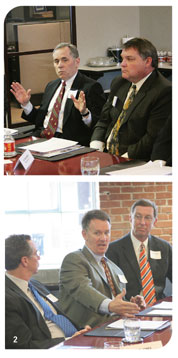Politics
One sensitive subject that Tom Turner did not hesitate to raise was the question of the ongoing mayoral race in Kansas City. “We’ve had a number of years here with a progressive movement,” he observed. “We seem to have a difference of opinion on where we should be going from the few guys [Alvin Brooks and Mark Funkhouser] that are running.”
“Most people have concerns about Funkhouser with regard to his thinking about development and TIF in particular,” said Buzz Willard of Tower Properties. “And I think there is reason to have that concern.”
“There really is very little development, whether it’s downtown or up at the airport that doesn’t get some kind of incentive, whether it’s retail, office, or whatever,” said Olen Monsees. “It’s an incentive game, and I think it’s got to be played.” Monsees questioned whether Funkhouser, if elected, would adapt to the realities of that game.
The question was raised as to whether Funkhouser’s desire to replicate the dynamic, Richard Florida-inspired, “creative class” model for Kansas City would offset the fact that he is not perceived as being incentive-friendly.
Carl LaSala did not seem to think so. “I would like to see someone who is going to continue to do what has happened over the last several years,” he noted.
“I think it is critical that we continue to generate that kind of momentum that we’ve got,” Turner agreed. “That doesn’t mean we should give away every dollar to every person every time. But it certainly means you’ve got to look objectively at what it takes to generate that sort of [vibrant] surrounding.”

1: Carl LaSala of LaSala-Sonnenberg Commercial Realty discusses the dynamics associated with Kansas City, Missouri's mayoral campaign and the need for the continuance of a pro-development environment in Downtown Kansas City and throughout the region.
2: Doug Weltner of Grubb & Ellis/The Winbury Group voices concerns about KCMO's ensuing mayoral election. Carl LaSala and Bob Johnson of R.H. Johnson observe with interest.
The group was asked what they would like to see the new mayor do in regard to continued development and what kind of gesture to the development community he should make.
Said Olen Monsees, “Funkhouser has an image now that he is going to put the brakes on [development]. He is going to fix the neighborhoods, the streets, the crime and what have you. That is what I perceive his position to be. He needs to modify that a little bit.”
When asked whether Alvin Brooks had made any overtures to the development community, Bob Johnson answered, “He doesn’t have to.” As Johnson elaborated, “Brooks stands for a continuation of Mayor Barnes.”
Kathy Woodward likewise saw the need to “continue the momentum and the positive impact it has had.” She worried that the next mayor could jeopardize “a vibrant downtown” if the momentum is not continued.
“This mayoral race is significant as it relates to the progress that has been made in downtown Kansas City,” asked Tom Turner. “Are we really at a crossroads in terms of how this city is run at this election? Or not?”
“You hear a lot through the campaign about downtown versus the neighborhood,” said Jon Copaken, “I think whoever is the mayor needs to make sure they focus on the connection.” As Copaken explained, downtown provides 25 percent of the tax base for the city as a whole. “The neighborhoods need downtown to be successful in order to get those services they say they are lacking.”
The Process
For Olen Monsees, there were two related issues. One was a continued commitment to new development. And the second was a commitment to “simplifying the process”—namely how city management expedites development.
Although Doug Weltner did not express an opinion on incentives, he did raise the issue of process. “Funkhouser has said he would like to see the city manager change and I am not sure that’s positive.”
Although acknowledging improvement under current city manager Wayne Cauthen, Buzz Willard cited “a lack of accountability” at City Hall that persists despite his efforts, “an environment of I will do what I want–when–and how I want.”
Tom Turner elaborated that developers face challenge in all major cities, “but it reaches a new level here.” He conceded that the process “has improved some, but it has a ways to go.”
Monsees questioned whether the “process” problem was even fixable. “That’s been on the agenda of everybody that I have ever talked to at City Hall,” said Monsees. “They have had committees. It seems like an immovable object.”
On the positive side, as Jon Copaken noted, “Four years ago, we didn’t have these problems or challenges to talk about,” mainly because there was so little development going on.
In that no one was sure of the opinions of either candidate, we asked them both to clarify their positions on economic development, and they both graciously obliged.
(...continued)